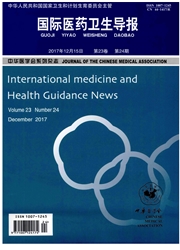

 中文摘要:
中文摘要:
目的探讨意象对话疗法在康复期精神分裂症患者心理康复过程中所起作用。方法选择开放式管理住院康复期精神分裂症患者80例,用随机数字表法分为实验组和对照组各40例。两组患者均给予常规抗精神病药物治疗,对照组给予常规传统的护理管理方法,给予工娱疗法和集体活动,实验组在此基础上给予每周一次共8周的意象对话疗法。两组患者治疗前后分别以症状自评量表(SCL-90)、康复状态量表(MRSS)以及社会功能缺陷筛选量表(SDSS)各评定一次。结果干预后实验组患者躯体化、强迫、人际关系、抑郁、焦虑、恐怖6因子得分明显低于对照组,两组比较差异有统计学意义(P〈0.01);两组患者MRSS总分与各分量表分以及SDSS评分比较差异有统计学意义(P〈0.01)。结论意象对话疗法改善患者负性情绪,提高了治疗依从性和生活质量,有利于康复期精神分裂症患者的心理康复。
 英文摘要:
英文摘要:
Objective To explore the effect of image dialogue therapy on psychological state of patients with schizophrenia during recovery phase. Methods 80 hospitalized patients with schizophrenia during recovery phase under open management were selected, and divided into experimental group and control group with 40 cases in each group by the random number table method. The patients in two groups were given conventional antipsychotic drugs. Control group was given conventional traditional nursing management method, including occupational-recreational therapy and collective activity, and experimental group was given image dialogue therapy once a week for 8 weeks on the basis. SCL-90, MRSS, and SDSS were used to compare the effect between two groups. Results After intervention, the score of 6 factors including somatization, constraint, interpersonal relationship, depression, anxiety, terror in experimental group were significantly lower than those in control group (P〈0.01); there were statistically significant differences in SDSS score, total score and the scores of each subscale of MRSS between two groups (P〈0.01). Conclusions Image dialogue therapy can improve patients' negative mood, the treatment compliance, and the quality of life, which is helpful to psychological rehabilitation of patients with schizophrenia during recovery phase.
 同期刊论文项目
同期刊论文项目
 同项目期刊论文
同项目期刊论文
 期刊信息
期刊信息
